Meditating about Now: On a Mindfulness Retreat with Jon Kabat Zinn
For the past few years, I've been reading about, studying and practicing mindfulness. And in that time, I've learned that mindfulness is a form of Buddhist meditation focused on being in the present moment. I've learned how research shows that an 8-week course in Mindfulness-Based Stress Reduction or MBSR is helping people cope with depression, anxiety, stress, eating disorders, addictions, asthma, hot flashes and psoriasis. And I've also learned that there are published studies in peer-reviewed journals that can back these claims up. And that many of these scholarly articles were either authored or co-authored Dr. Jon Kabat-Zinn.
So when I got the chance to go on a six day mindfulness retreat with Dr. Jon Kabat Zinn and 35 other "business leaders", I decided to do it (even though it was very expensive). This blog is about my experience on that retreat.
Friday Day 1
As I was walking in the front entrance of Menla Mountain Resort, a Buddhist retreat center, in Phoenicia, New York, I couldn't help but think about the $3950 I had plunked down on my credit card to spend 6 days meditating with Jon Kabat Zinn, author of numerous books on mindfulness. What was I thinking? It was enough money to take a family of five (e.g., my family of five) on a one week cruise to the Caribbean! Could it possibly be worth that much money to learn how to be more "in the moment" for six days in the Catskills? In November?
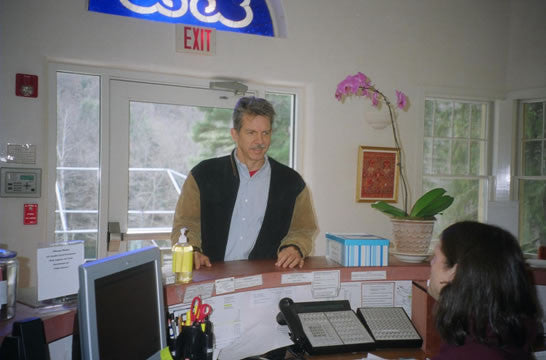
Here I am arriving at Meditation Retreat Center, just prior to meeting Jon Kabat-Zinn
So I was pretty excited to meet him in person. This was like a fantasy camp and Jon Kabat Zinn was the Babe Ruth of Mindfulness. He'd been interviewed by Oprah, Bill Moyers, talked to the Dalai Lama and had been dubbed "Mr. Mindfulness" by the Washington Post. So when he walked up to me at the registration desk with his short build, his salt and pepper hair and his silver eyebrows jutting up above his gold wire-rimmed glasses, I recognized him instantly. "Hello," I said, extending my hand, "I'm Jim Porter."
"Hi," he said reaching out to shake mine, "I'm Jon Kabat Zinn."
The opening session, took place that night, in a Yoga studio, about a half mile down a dirt road. The other participants and I walked along in the dark, getting to know one another as we tried not to fall into the numerous ruts and ravines we stumbled across along the way. In my group there was a psychiatrist from Nevada, an entrepreneur from San Francisco, and a retired businessman from Ireland.
For our first activity of the night, Kabat Zinn guided us through a meditation where we were all supposed to picture a pebble dropping down a well. When he asked people to comment on it afterwards, one woman, with dyed orange- blond hair said the pebble dropping faster and faster was like a metaphor for her life up until that point. Hitting the water with a splash represented her arrival at the retreat. The slow descent through the water was the retreat itself. And the pebble landing on the bottom - in the crystal clear still water - was where she hoped to be by the end. It was such a vivid metaphor for what we all were feeling that everyone's jaw just kind of dropped, en masse. A slightly plump, bald, fifty year old man sitting in the corner of the room started slowly clapping his hands and others joined in spontaneously.
But Jon Kabat Zinn interrupted the applause as quickly as it started and announced, sternly: "It isn't fair to clap for some people and not for others," he explained, "So I'd prefer it if we didn't applaud at all."
The person who had initiated the clapping shot back: "That feels like a put-down." Kabat Zinn assured him that it wasn't. But on the other hand, he had made it very clear who was going to lead this retreat.
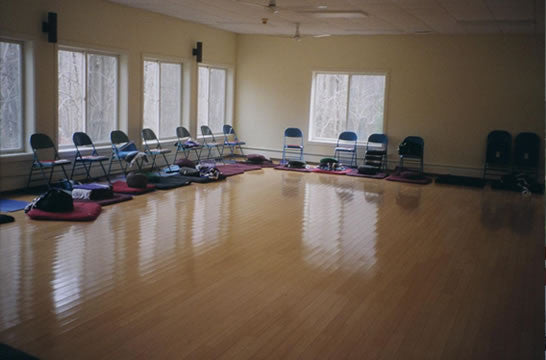
The Yoga studio, before people arrived. We could sit in a chair or on the meditation cushions in front of the chairs.
Saturday Day 2
The next morning, we assembled in the Yoga Studio at 9AM sharp. It was a comfortable space, like a dance studio, about a third the size of a standard gymnasium with a polished wood floor and windows that looked out on the sloping brown hills that engulfed us on four sides. Inside, there was a circle of 37 blue metal folding chairs and in front of each chair was a matching set of meditation cushions. So each person could choose to sit up in a chair or down on the cushion. Most people opted to sit on the floor.
"Welcome," Jon Kabat Zinn said, sounding truly grateful for our presence in the room. "Just you being here, doing what it takes to get your bodies here in this room is a radical act of kindness, sanity and love."
"Mindfulness is defined as being in the present moment with acceptance," he explained. The goal of mindfulness meditation is simply to be more present with whatever is going on inside you and around you. During the retreat we learned how to do this by focusing our awareness on body sensations, on thinking in a detached way, on environmental sounds, and even through a more mindful practice of yoga. But most of all, we focused on our breathing.
"Bring the breath to center stage, and leave everything else in the wings," Kabat Zinn said, sounding a bit dramatic. "If your mind wanders a thousand times away from the breath - and it will - your job is to bring it back a thousand times. And try to throw out the idea of 'Oh, now I'm meditating, or I'm meditating well, or I'm meditating badly.'"
"And don't be too attached to the outcome. Any good scientist knows that attachment to the outcome can ruin an experiment. It can color your results." He didn't seem to want us to go looking for any particular outcome. It was a bit like a Zen Koan, the short Japanese poems which on the surface don't seem to make any sense: We were to strive without striving, aspire without aspiring and be goal-oriented without caring whether we actually achieved the goal.
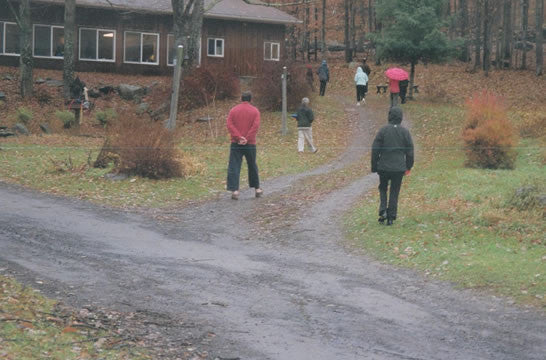
Everyone on the way back into the Yoga Studio after the mindfulness walk. Every day we would alternate numerous times between meditating and walking. Usually it was about an hour of each.
After lunch we did our first walking meditation. We were supposed to walk along in super-slow motion trying to concentrate on the rise and fall of each foot along its path from one footfall to the next. Basically we all looked like zombies doing this. If anyone from the outside world had walked in on this exercise, they absolutely would have believed that Jon Kabat-Zinn was some kind of Jim Jones and we were all about to drink the Kool-Aid. So with that thought floating around in the back of my head, I began walking very slowly for ten paces forward and then I'd turn around and walk ten paces back, over and over.
After dinner Jon talked about the philosophy of mindfulness. "We have to be careful not to impose the grid of everything we already know over everything we don't know," he said now talking about the urge to pass judgment on people and activities. "Every second is new by definition." It's not just about being in the present, it's about what results when, in the present, you completely let go of the past. "When you use your ideas about who someone is as a way to disregard them, you're lost." But when you tune into the moment, you see subtle differences that maybe you didn't see before and as the result, conflicts dissolve, arguments don't seem so important and aversion or hate is transformed into a new-found respect.
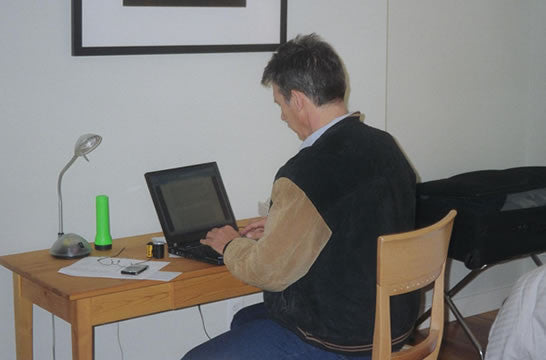
Every night except during "the silence" I went back to my room and typed up my notes from that day. I found it hard to get out of the habit of DOING!
Sunday Day 3
You could say that Jon Kabat Zinn is to mindfulness what Henry Ford was to the automobile. He didn't invent it, he didn't even make a better version, he simply came up with an assembly line method for teaching mindfulness and then figured out a way to mass-market it. He did this by creating a standardized 8-week course and various "certification" courses to train nurses and other medical professionals how to teach it.
He also appealed to a much broader (Western) audience by writing books that people would actually read, by filtering out the religious overtones and by calling it something medical-sounding like Mindfulness Based Stress Reduction (rather than Buddhist Meditation Practice or God forbid what it really is: The Dharma). Soon Mindfulness Based Stress Reduction got its own neat little acronym, MBSR, and even spawned a veritable alphabet soup of related acronyms (other mindfulness-based therapies for depression, eating disorders and addiction) including MBCT (Mindfulness Based Cognitive Therapy), MB-EAT (Mindfulness Based Eating Awareness Training) and MBRP (Mindfulness Based Relapse Prevention).
By starting his MBSR clinic at a hospital (The University of Massachusetts Medical Center), by encouraging rigorous scientific studies (getting them published in scientific journals) and by steering his staff away from anything that seemed foreign to Western eyes ("I wouldn't permit anyone to bow in the hospital for the first twenty years.") MBSR flourished and has been embraced by the mainstream medical establishment (MBSR is now taught in over 200 hospitals), setting the stage for the beginnings of Integrative Medicine, where alternative Eastern therapies are integrated with standard Western treatment in hospital settings.
"I remember the moment like it was yesterday," he said recalling the first time he thought of creating MBSR. "I was at a conference in the 1970s. It all happened in about ten seconds and I knew exactly what I had to do. I'm not trying to toot my own horn, but medicine has been really changed by mindfulness in the last 20 years. NIH (National Institute of Health) is putting millions into mindfulness research and the number of articles published in professional journals about mindfulness is increasing exponentially every year."
Jon liked to talk, and he could easily extemporize on a single question, sometimes for as long as 30 minutes. Later in the afternoon, someone asked him about how to use mindfulness in the real world. It was one of his favorite topics.
"Mindfulness increases your personal power," he explained, sounding like a sales trainer at a Fortune 500 company. "Your power isn't siphoned off by the need to be right. It isn't sucked up by yesterday's argument and it isn't challenged by tomorrow's fear. Being here right now restores your power, frees you from old arguments and liberates you from fear. Being in the moment is about what's happening right now. And every moment is different from the one that just preceded it. So if something or someone bugged you yesterday, and it's bothering you today, chances are your grasping on to an old story. People love their stories of victimization, poor me, hard luck, difficult spouse, misbehaving children, etc."
"Moment by moment non-judgmental awareness is the key. That way we don't immediately jump into good or bad, black or white, like or dislike. We dwell in the realm (where truth exists) of discernment, of degrees of difference, and subtlety. The mindfulness meditator is less likely to have a story because he or she understands that everyone gets angry, and children misbehave and people let us down, and sometimes things don't go our way, but if it's not happening now, and carries no weight in the present, there's no need to bring it up or even consider it."
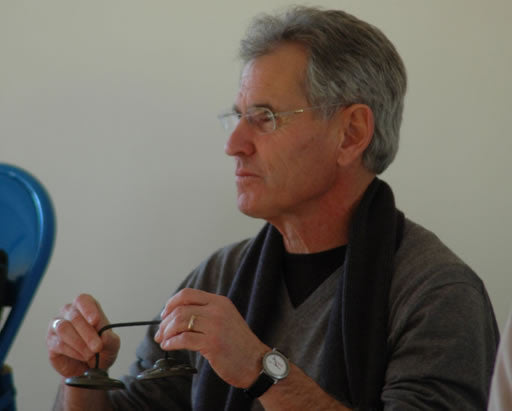
Jon Kabat Zinn with his Tibetan chimes. He rang these chimes three times after each meditation period.
After meditating, Jon always rings his tiny little Tibetan Cymbals three times. And at the end of the day he always had some closing words. His words on this third night of the retreat, would lead me, as it turned out, into something life-changing.
"When you walk out of here tonight I want you to leave in silence," Kabat Zinn explained. We will begin our retreat within a retreat - as he liked to call it - tonight and continue it throughout the day tomorrow.
People had been warning me that there was going to be an extended period of silence. And we had practiced this for a meal or two in the first couple of days of the retreat. But I had no idea how severe the restrictions were going to be until Jon Kabat-Zinn laid them out for us that evening. "During this time I don't want you to talk to anyone, I don't look at anyone in the eyes, don't read anything, don't text anyone, don't watch TV and don't use your computers."
"Can we write?" asked a woman who I think just wanted to hear herself speak one last time.
"No writing. And even when you go to bed, do it mindfully. Be aware of how it feels. Think about being in bed. When you wake up don't jump out of bed. Just lay there for a while and be aware of lying awake in bed. Remind yourself of where you are and what you are doing."
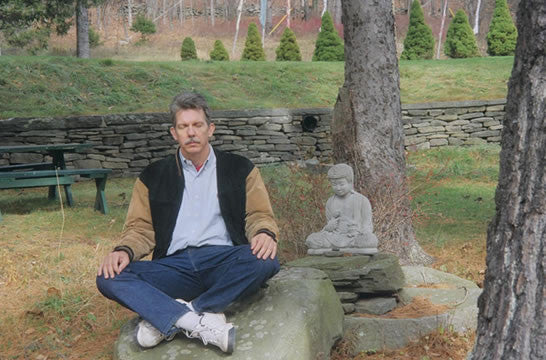
Just me and the Buddha meditating in between sessions.
Monday Day 4
The next morning, I sat directly across from JKZ at breakfast. Since we couldn't talk, I found myself strangely fascinated with the contents of his meal tray. There were two small servings of spinach-egg casserole and some strawberries on a white plate and a bowl of oatmeal with a big dollop of yogurt in the middle of the bowl. He ate at a normal tempo - not fast but not slow - and got up for seconds afterwards. I later noticed, he always got up for seconds but he was thin and seemed like he was in good shape. Mindfulness must be good for the metabolism, I thought.
When he came back to the table, he turned his chair around, to look out the window, rather than looking at me. Given the fact that we were maintaining "custody of the eyes," (not looking at each other) I assume he was just being practical and not rude.
So I tried to use the silent breakfast to further explore my interiority (a word JKZ liked to use a lot). When I over-salted my eggs it seemed like my father (who had been dead for years), and who also over-salted his eggs, was in the room with me as were my kids who had inherited this unhealthy habit, presumably from me. For a moment it felt like we were all there salting my eggs together.
I decided to close my eyes. I liked the idea that I was in no hurry to do anything - since there wasn't anything to do. Even though we had an hour before the next session, I couldn't go read the paper, I couldn't listen to my iPod, I couldn't check my email, I couldn't even phone home. I'd spent a lifetime driven by that voice in the head that says do something, accomplish more, acquire more, don't be lazy. But now, even though that voice wasn't completely silent, it had no raison-detre. So I could just choose to ignore it, close my eyes, and just BE.
The sun came out from behind a cloud and filled my eyelids with a kind of orange glow. It reminded me of laying out at the beach in the summer. And it occurred to me that laying out at the beach is one of the few times in life where being takes priority over doing.
Just then the sun went behind a cloud and the orange glow coming through my eyelids turned into a pale purple. I'm pretty sure the light purple was a remnant of the orange (temporarily burned into my retinas) plus the new darker color that had presumably already overtaken the sky. And when it eventually dissolved into black, I felt like I had been treated to my own all natural, non-drug induced, mind-made light show. And when I finally opened my eyes it was snowing. Wow!
Since I was in no hurry to do anything that day, I had plenty of time to think about things. So instead of being in the moment, occasionally thoughts like: why was I so disconnected from my kids, from my wife and even to some extent from what was going on during this retreat, would ping pong around the hollow walls of my thick skull. Then the clarifying thought occurred to me, that this was my job as a writer: to be the watcher, the interpreter; to see things through a screen of judgment.But I had gone on this retreat to be on it, not to write about it. So this sense of detachment always left me feeling like I was one step removed from the action: like a person at a dance who never dances.
I walked up to my room, to use the toilet. A sign on the wall said: "Please use as little TP as possible." In the bathroom, I remembered what JKZ had said earlier in the day. "The signature feature of a retreat is there are no breaks. You walk back to your room mindfully and you lay down in bed mindfully and you go to the bathroom mindfully." Was I not being mindful thinking about what he said earlier instead of thinking about doing what I was doing at that moment? Yes, I thought. But, he also said that as soon as you become aware that your mind has been hijacked - you're back in the moment. Ah, so I was OK, for the moment.
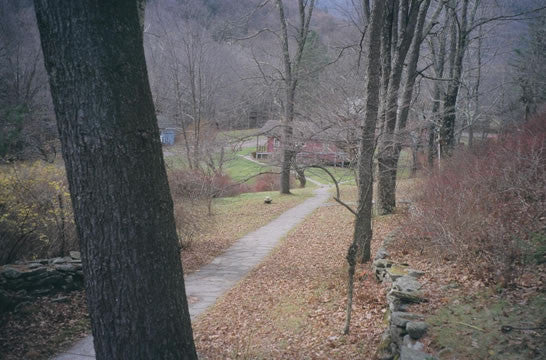
The path leading from the dining hall to the Yoga Studio
As I walked back down the dirt road to the yoga studio, I noticed an abandoned vegetable garden that, in early November, still had a few tomato vines growing in it. I also noticed two tennis courts that hadn't been played on in a while, and the tarpaulin-covered pool that nobody had been swimming in for months. These reminders of another season, made it hard to be in this season. All the trees had released their leaves, except for a few tenacious beeches, their light brown leaves trembling in the cold wind. Late autumn had a stark beauty all its own, I thought. But it's a beauty that I'd never been able to appreciate before. For some reason, these images had more intensity and more power. I wondered if the "retreat within a retreat" was beginning to lay tracks in that gray matter we all call consciousness.
But by the afternoon session things began to fade. My shoulders started to cramp up from all the "sitting" (meditation). Eating meals without being able to smile back at someone seemed like punishment. (And of course you had to just get up and get the salt, because you couldn't even signal someone for it because that would require making eye-contact.)
And then, in the late afternoon session, I noticed a rather loud mouse in the wall. "Isn't anybody else bothered by this damn thing?" I wondered, trying unsuccessfully to block out the sound of the mouse and focus on my breathing. Then there was the coffee pot in the foyer rattling and hissing like an old steam engine. I opened one eye and surreptitiously peered about hoping to find someone looking as irritated as I was. But everyone just kept right on meditating. How dare they all just sit there looking so serene? I don't know about them, but I certainly didn't pay $4000 to not have any fun, not be able to talk to anyone, and be locked up in this prison of my mind, essentially all by myself. And I certainly didn't pay all that money to be distracted by a stupid mouse and a coffee pot, trying to meditate while my shoulders muscles were starting to spasm.
Soon it was time to do another Mindfulness walk, and given my state of mind, I wasn't sure I had the patience for it. As we got up to leave the room I noticed Kabat-Zinn walking over to where the mouse had been working out in the wall. Jon just stood there, with his back against the wall for the longest time. Was it just coincidence or was Mr. Mindfulness bothered by the mouse too? I tried desperately to read the look on his face (without making eye contact, of course). Was he annoyed? Was he angry? Was he thinking, "I paid x number of dollars to rent this retreat center and they can't keep the damn mice out of the walls?" I couldn't tell. Eventually he headed outside to do the mindfulness walk along with everyone else.
I took one look at all the Zombies and I decided I needed to be by myself. I headed up the road, around the bend and walked at my own pace, trying to stay mindful without looking like a creature from the dead. About 15 minutes into my walk, it started to snow fairly hard so I cut through the woods in order to get back to the yoga studio before the snow got too deep. I noticed there were apple trees growing in the thick woods and deer were feeding on their own little windfall. I remembered a brochure I had picked up about the Menla Mountain House, (our retreat center) and how it had originally been the estate of some rich New York City Banker. I guessed that this was once an apple orchard, now long since overgrown.
As I drew closer to the Yoga studio I was feeling more alone and more detached from the whole retreat experience. I missed my family, I missed my friends, I missed talking to people, looking at people in the eyes and I was cursing myself for spending so much money on this stupid experience. I should have put the $4000 toward a family vacation, or a new kitchen or a new car or toward my retirement.
Then, the flurries changed to a much harder mix of snow and freezing rain. It was coming down hard now, but it was landing in tiny pellets of icy-snow. It was loud like rain but it was turning the ground around me from brown to white. In fact, all I could hear was the sound of the snow hitting the dry leaves.
As I focused on this surprisingly loud sound, something strange happened. For a split second, I couldn't tell where I ended and the woods began. I was the sound of snow hitting leaves. Intensely, I thought about these woods and the history, and I wondered how many people had stood in exactly this spot before me. For a split second, I was just as much the owner of these woods as Menla Mountain House, or the rich New York City banker who preceded them, or the Native Americans who preceded us all. These seemingly random images were flowing over me in a unified way that I didn't try to label, assign meaning to or discern. And for another split second even my shabby kitchen, my old car and my meager retirement savings all seemed perfect. It was an indescribable feeling that had magically emerged out of a bucket load of pain.
Months before, I had read in Eckhart Tolle's book, The Power of Now, about how these fleeting moments of pure bliss, called Satori, could occur. But I was way too jaded to think that something like this would ever happen to me. Tolle defined it as a moment of enlightenment where you get a glimpse of what it might feel like to be enlightened without getting there permanently. The moment ended as quickly as it began but when it was over I KNEW I had experienced Satori: You feel completely connected to the world around you for one split second and then it's gone.
By the time I returned to the studio, everyone was inside except Jon who was deliberately hanging back for some reason. As I walked up the path to the door, I saw him move away from away from me which seemed odd. I was the last one in, and usually he didn't like to keep people waiting for him to arrive. So I was curious and watched as he walked toward the left outside wall of the studio, right where the sound of the mouse had been coming from an hour before. I have no way to be sure, but as he bent down on one knee, he seemed to be searching for some crack or crevice where that mouse might have entered the building. And, as I walked up the steps to the door, the thought occurred to me, what could a Buddhist Retreat Center possibly do about a mouse in the wall?
I walked through that door, a different person than the person who had walked out.
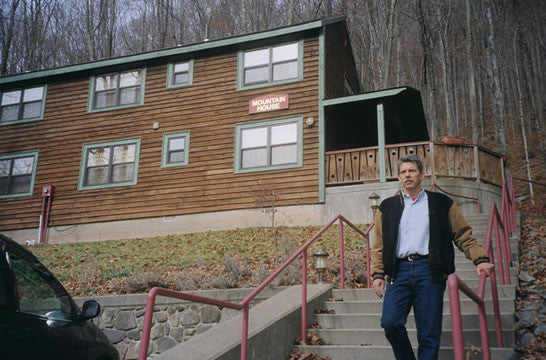
Walking down the steps to breakfast from my room.
Tuesday Day 5
The next morning after breakfast, we broke the silence and the floor was wide open for questions. "Is there a bag of tricks you can give us to take back home?" a woman from Denmark asked, who I had accidentally made eye-contact with during the silence.
"What does the sign say at a Railroad Crossing?' JKZ asked back.
"I don't know, I'm from Denmark," and everyone in the room laughed except Jon Kabat-Zinn.
"It says: stop, look, listen," Kabat-Zinn replied, always ready for the next moment.
"Right in the middle of losing your mind there are lots of things you can do," he continued, now apparently on a mindfulness roll. "You can: 1. Just flip out. 2. Get your fucking ass and put it on a cushion," he said, now sprinkling in curse words for the first time during the retreat. "Do something to change the place your in. Take a break. Remind yourself, life goes on, I'm still alive. 3. Listen deeply. 4. Stop, really stop. Even if you think you don't have time to - that's probably just mind-created anyway - remember the law of impermanence. Everything changes. Your anger, your crazy mood, your strong emotions will all go away."
"Do I need to meditate every day for 45 minutes?" asked a young guy from New Jersey in a flannel shirt.
"Try to meditate and see how much you get back. This practice is entirely empirical. It's got to work for you or it doesn't work at all. When we sit, this is where we hone our skills. We get better at understanding our thoughts, and being aware of our emotions. How they're linked and how we can separate who we are from them."
"How much time do you spend meditating?" I asked him, wandering if he'd take issue with this question.
"I don't want to reify my practice," he shot back as I predicted, "then you'll all try to imitate what I do rather than figure out what's best for you. But what I am willing to say is: for forty years I got up at 5AM every morning and did a combination of yoga and meditation for two hours every day."
A former Madison Avenue advertising executive, shouted out. "I just got two and a half pieces of bad news, and to be honest, I'm not sure how I'm supposed to handle it? "He clearly sounded agitated. "What did I learn over the last 36 hours that I'm supposed to apply to that bad news?"
Whenever there was a tough question, or one that had some emotion attached to it, Jon would take a deep breath in, breath out, think for a minute and just let the words of the questioner hang in the air. And when he was good and ready he would answer. "The whole world is collaborating in your education - your curriculum. It might help to take the bad news and put the welcome mat out for it. Your mind is already making up stories and maybe they're not accurate."
At the end of that afternoon session and what was now getting to be the waning hours of our retreat, we did the Mountain Meditation. I had been told that this was Jon's signature meditation exercise for an MBSR retreat. Now that most of us were able to sit in the full lotus position, (after a week of sitting, your legs start to bend in ways they never did before) the observation that we were like mountains truly seemed plausible. "Imagine your arms are like the sloping sides of the mountain and your head is like the high peak. The whole body is majestic and magnificent."
"We sit in stillness like mountains. The seasons change, the weather changes, people come and go, but the mountain remains unchanged. Storms swirl around the mountain, but the mountain is always grounded, always rooted in the earth, always still. The mountain shows us that we can be stable and balanced in the face of the emotional storms in our own minds and bodies."
At the end of the meditation I felt like I had finally gotten it. Mindfulness was about a lot of things - not just about being in the moment. It was about acceptance, it was about not passing judgment, not clinging to old ideas and it was about not resisting the inevitable process of change. When we are inside our thinking brain - as most of are 24/7 - our thoughts and emotions rule the day. But below that thinking brain was our mountain, our awareness, our knowing that everything we in the West hold so dear: our cars, our jobs, our stainless steel kitchen appliances was like the weather and the changing seasons on top of that mountain. It was all as ephemeral as falling leaves. But the mountain is unchanging, unalterable, never-ending.

Jon Kabat-Zinn did his mindfulness walk in the exact same spot every time. Walking the same ten paces back and forth for the entire 45 minutes.
Wednesday Day 6
After breakfast, Jon was in no hurry to move into whatever activity would be the last activity of the retreat. People uncharacteristically stood milling around talking for what seemed like about a half an hour instead of taking their seats. Finally he rang his tiny Tibetan bells as loud as he could - comically clanging the little cymbals like a percussionist in an orchestra - to get people's attention. When everyone quieted down and were seated, he began.
"How many people in the room will have a person or persons waiting for them when they get home?" The majority of hands went up. "Imagine this person and what they are doing right now. Remember people at home and at work may not have missed you but instead may be resenting all the work they had to do while you were gone."
"And when they asked you what you did on this retreat it may be best to say as little as possible. They probably don't want to hear that you meditated, laid around, ate gourmet meals, did yoga for six days and still managed to suffer. They just won't get it. So just don't tell them anything. Or if they really press, just tell them we meditated a lot."
It was about 10:30 and the retreat was going to end in less than an hour, whether we wanted it to or not. And there was this palpable sense in the room that everyone was hoping that it wouldn't end. JKZ opened the floor to anyone who wanted to make a closing statement.
An older woman, who was wearing a green wool coat like my Grandmother used to wear, said she'd realized something very profound. In a shaky old-lady voice she said: "When I arrived on Friday, Jon, I'd come here for you. You were my teacher. But yesterday I realized I was not here for you. I was here for me."
And without hesitating JKZ responded: "it's about time you realized that."
A frail looking older gentleman (I guessed to be in his late seventies or early eighties) said he wanted to recite a poem he'd memorized from one of JKZ's books:
"The birds have vanished..." he began, and then stopped, choking on his own words.
He started again, this time, his voice barely above a whisper, almost as if he were talking from his deathbed.
"The birds have vanished into the sky
and now the last cloud drains away.
We sit together the mountains and me.
Until only the mountains remain."
Some people looked sad, some people were sniffling and others were just sobbing outright. I had to admit, even formally jaded old moi, was holding back tears. At that point a round-faced woman from Miami, who seemed like the happiest person I'd ever met, just started singing: There's a smile on my face. For the whole human race. And it's almost like being in love.
She sang the whole song from start to finish in a perfect soprano voice and in perfect tune. And when she was done the whole room broke out in spontaneous applause for what was only the second time during the entire retreat.
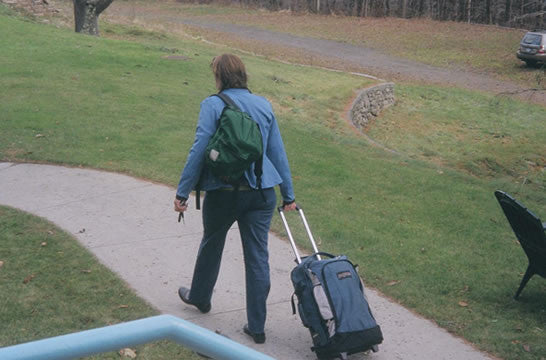
The last meditator leaves for home.
Epilogue
It's been two years since I went on that retreat and it's only now, with the benefit of hindsight, that I can honestly say that I got my money's worth. To be honest, it was a hell of a lot of money to pay for an experience that wasn't always pleasant and was sometimes downright unpleasant. But the retreat brought about one simple change. Before the retreat, I was totally enamored with mindfulness, but I didn't practice mindfulness. After the retreat I actually started meditating every day.
And that has really changed me. Author and mindfulness expert, Ron Siegel, often talks about state changes (what you feel while meditating) vs. trait changes (what you feel as the RESULT of meditating). And it's those trait changes that add up, little by little, over time. The work coming out of Richard Davidson's lab at the University of Wisconsin confirms this: The brains of regular meditators really do change for the better over time. The left pre-frontal cortex (an area of the brain associated with happiness and pleasant moods) actually gets bigger.
And, as a person who meditates now, for at least a half an hour every day, I can feel the change inside me. I'm happier. I'm less moody. Even my kids can see it. They say they like me more. My 21 year old son calls me "the Zen master." And now my wife has started calling me "Buddha Jim." What more proof do you need than that?















James Porter
Author